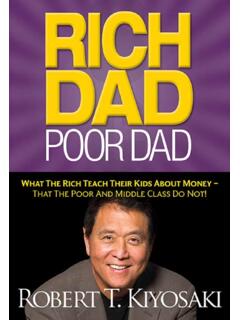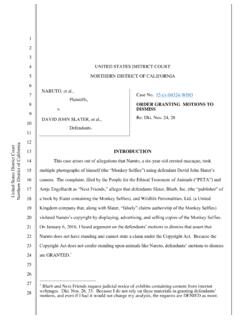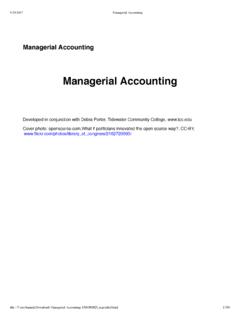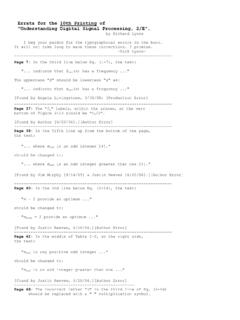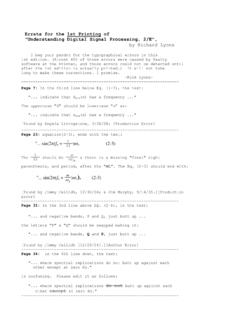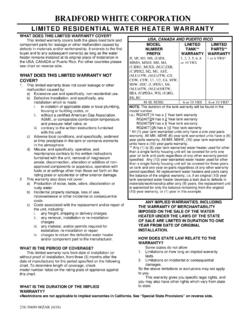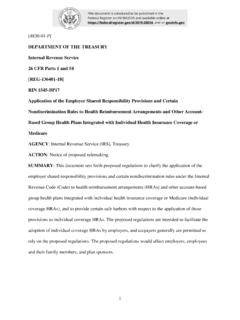Transcription of [4830-01-p] DEPARTMENT OF THE TREASURY Internal …
1 This document is scheduled to be published in the Federal Register on 03/06/2019 and available online at , and on [4830-01-p]. DEPARTMENT OF THE TREASURY . Internal Revenue Service 26 CFR Part 1. [REG-104464-18]. RIN 1545-BO55. Deduction for Foreign-Derived Intangible Income and Global Intangible Low-Taxed Income AGENCY: Internal Revenue Service (IRS), TREASURY . ACTION: Notice of proposed rulemaking. SUMMARY: This document contains proposed regulations that provide guidance to determine the amount of the deduction for foreign-derived intangible income and global intangible low-taxed income. This document also contains proposed regulations coordinating the deduction for foreign-derived intangible income and global intangible low-taxed income with other provisions in the Internal Revenue Code. DATES: Written or electronic comments and requests for a public hearing must be received by [INSERT DATE 60 DAYS AFTER DATE OF PUBLICATION IN THE. FEDERAL REGISTER].
2 ADDRESSES: Send submissions to: CC:PA:LPD:PR (REG-104464-18), Room 5203, Internal Revenue Service, Box 7604, Ben Franklin Station, Washington, DC. 20044. Submissions may be hand-delivered Monday through Friday between the hours of 8 and 4 to: CC:PA:LPD:PR (REG-104464-18), Courier's Desk, Internal Revenue Service, 1111 Constitution Avenue NW, Washington, DC 20224. Alternatively, taxpayers may submit comments electronically via the Federal 1. eRulemaking Portal at (REG-104464-18). FOR FURTHER INFORMATION CONTACT: Concerning proposed (a)-1. through (b)-6, , , , and , Kenneth Jeruchim at (202) 317-6939; concerning proposed , and , Michelle A. Monroy at (202) 317-5363 or Austin Diamond-Jones at (202) 317-6847; concerning submissions of comments and requests for a public hearing, Regina L. Johnson, (202). 317-6901 (not toll free numbers). SUPPLEMENTARY INFORMATION: Background This document contains proposed amendments to 26 CFR part 1 under sections 250, 962, 1502, 6038, and 6038A ( proposed regulations ).
3 Section 14202(a) of the Tax Cuts and Jobs Act, Public Law 115-97 (2017) (the Act ), added section 250 to the Internal Revenue Code (the Code ).1 The new section provides a domestic corporation with a deduction ( section 250 deduction ) for its foreign-derived intangible income ( FDII ) and its global intangible low-taxed income ( GILTI ) and the amount treated as a dividend under section 78 which is attributable to its GILTI. Section 14202(c) of the Act provides that section 250 and the conforming amendments in section 14202(b) apply to taxable years beginning after December 31, 2017. Section 14201(a) of the Act (codified in section 951A) requires a United States shareholder ( shareholder ) of any controlled foreign corporation ( CFC ) for any taxable year to include in gross income the shareholder's GILTI for the year. The DEPARTMENT of the TREASURY ( TREASURY DEPARTMENT ) and the IRS published a separate 1. Except as otherwise stated, all section references in this preamble are to the Internal Revenue Code.
4 2. notice of proposed rulemaking that provides guidance to shareholders on how to determine the amount of GILTI to include in gross income. See 83 FR 51072 (Oct. 10, 2018). Section 14302(a) of the Act also added a new foreign tax credit category for foreign branch income (defined in section 904(d)(2)(J)), which is cross-referenced in section 250(b)(3)(A)(i)(VI). The TREASURY DEPARTMENT and the IRS published a separate notice of proposed rulemaking that provides rules for determining a corporation's foreign branch income for purposes of section 904. See 83 FR 63200 (Dec. 7, 2018). Explanation of Provisions I. Overview of Proposed Regulations In general, income earned directly by a person on foreign business income is subject to tax on a current basis. Before the Act, foreign business income earned indirectly by a person through a foreign corporation was not generally subject to tax until such income was distributed as a dividend to the person.
5 Certain anti-deferral regimes could cause the owner to be taxed on a current basis in the United States regardless of whether the income had been distributed as a dividend to the owner. Sections 951 through 965 of the Code (generally referred to as the subpart F provisions), applicable to certain passive and mobile categories of income earned by CFCs, is the main anti-deferral regime of relevance to corporate groups. However, because subpart F does not generally apply to active foreign business income of a CFC (as defined in section 957(a)), shareholders before the Act could indefinitely defer taxation with respect to their foreign business income -- in particular, mobile income arising from the exploitation of intangible property -- by allocating such income to its CFCs operating in low- or zero-tax jurisdictions. This 3. system of deferral, in turn, resulted in a lock-out effect, whereby shareholders that had allocated income to CFCs formed in low- or zero-tax jurisdictions could not repatriate such income to the United States without incurring significant tax.
6 In order to facilitate the efficient redeployment of foreign earnings in the United States, the Act established a participation exemption system under which certain earnings of a foreign corporation can be repatriated to a corporate shareholder without tax. See section 14101(a) of the Act and section 245A. However, Congress recognized that, without any base protection measures, the participation exemption system could further incentivize taxpayers to allocate intangible income to CFCs formed in low- or zero-tax jurisdictions because the earnings related to such intangible income could now be repatriated to the United States without incurring any tax. See Senate Committee on the Budget, 115th Cong., Reconciliation Recommendations Pursuant to H. Con. Res. 71, at 370 (Comm. Print 2017) ( Senate Explanation ). Therefore, Congress enacted section 951A, which subjects a shareholder's global intangible low-taxed income or GILTI (a new term created by the Act) derived through its CFCs to tax on a current basis, similar to the taxation of such CFCs' subpart F income under section 951(a)(1)(A).
7 Most member countries of the Organisation for Economic Co-operation and Development ( OECD ) provide a full or partial ( , 95 percent) participation exemption with respect to income of foreign subsidiaries distributed to domestic shareholders. See OECD (2018), Tax Policy Reforms 2018: OECD and Selected Partner Economies, at 73, OECD Publishing, Paris (Sept. 2018). While some countries also have CFC. inclusion regimes similar to subpart F that subject certain narrow classes of income of 4. foreign subsidiaries to current tax in the home country, many countries do not subject active foreign business income of foreign subsidiaries to current tax. Congress recognized that taxing such income at the full corporate tax rate could hurt the competitive position of corporations relative to their foreign peers, and therefore determined that GILTI earned by such corporations should be subject to a reduced effective tax rate. See Senate Explanation, at 370.
8 Accordingly, Congress enacted section 250, which provides corporate shareholders a deduction of 50. percent for taxable years beginning after December 31, 2017, and before January 1, 2026, with respect to their GILTI, and the amount treated as a dividend under section 78. which is attributable to their GILTI ( section 78 gross-up ). In contrast, a domestic corporation's inclusion of its CFCs' subpart F income is not eligible for the section 250. deduction, and is therefore generally subject to tax at the full corporate rate. After the Act, income earned directly by a domestic corporation is subject to a 21. percent rate. Absent a deduction with respect to intangible income attributable to foreign market activity earned directly by a domestic corporation, the lower effective tax rate applicable to GILTI by reason of the section 250 deduction would perpetuate the pre-Act incentive for domestic corporations to allocate intangible income to CFCs formed in low- or zero-tax jurisdictions.
9 Therefore, to neutralize the effect of providing a lower effective tax rate with respect to the active earnings of a CFC of a domestic corporation through a deduction for GILTI, section 250 provides a lower effective tax rate with respect to foreign-derived intangible income or FDII (a new term created by the Act) earned directly by the domestic corporation through a deduction of percent for taxable years beginning after December 31, 2017, and before January 1, 5. 2026. The result of the section 250 deduction for both GILTI and FDII is to help neutralize the role that tax considerations play when a domestic corporation chooses the location of intangible income attributable to foreign-market activity, that is, whether to earn such income through its operations or through its CFCs. The proposed regulations provide guidance for determining the amount of the section 250 deduction allowed to a domestic corporation for its FDII and GILTI. Proposed (a)-1 provides rules for determining the amount of the deduction, including rules for applying the taxable income limitation of section 250(a)(2).
10 Proposed (b)-1 provides general rules for computing a domestic corporation's FDII. Proposed (b)-2 provides rules for determining a domestic corporation's qualified business asset investment ( QBAI ), which is a component of the computation of FDII. Proposed (b)-3 provides general rules for determining gross income included in gross foreign-derived deduction eligible income ( gross FDDEI ), which is a component of the computation of FDII. Proposed (b)-4 provides rules for determining gross FDDEI from sales of property. Proposed (b)-5 provides rules for determining gross FDDEI from the provision of a service. Proposed (b)-6 provides rules relating to the sale of property or the provision of a service to a related party. II. Amount of Deduction Allowed Under Section 250(a). Proposed (a)-1 provides general rules to determine the amount of a domestic corporation's section 250 deduction and associated definitions that apply for purposes of the proposed regulations.


